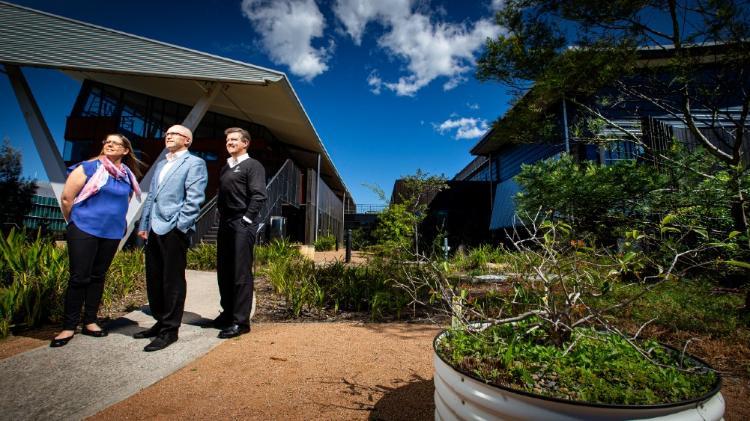Case studies
- UOW’s green hydrogen energy research boosted to world stage
- Next generation batteries enabling electric mobility and storage of renewable energy
- Inaugural Illawarra Clean Energy Expo at Parliament House
- Microgrid to enable critical clean energy research
Born at UOW, Hysata, which is accelerating the shift away from fossil fuels to green hydrogen, was recognised on a global stage, receiving the Energy Transition Changemaker award at the United Nations Climate Change Conference, COP28.
Hysata was one of 28 global companies to receive the award and beat a field of 1000 contenders from Australia. The award, which recognises businesses on the front line of the green energy revolution, acknowledged Hysata’s work in Queensland, where they are developing a five-megawatt electrolyser alongside power-generator Stanwell for use in Rockhampton.
Electrolysers, which use electricity to split water into hydrogen and oxygen, are the key technology for producing green hydrogen. Senior Professor Gerhard Swiegers, the brains behind the development of electrolyser technology, was named a 2023 Australian Research Council (ARC) Industry Laureate Fellow and awarded a grant of $3.7 million to further his research.
This funding will not only accelerate the decarbonisation of high carbon industries such as heavy transport, chemical production and steel manufacture, but will help Australia achieve its net-zero emissions commitments and contribute to developing a national green hydrogen industry.

- SDG 7 - Affordable and Clean Energy
- SDG 9 - Industry, Innovation and Infrastructure
- SDG 13 - Climate Action
- SDG 17 - Partnerships for the Goals
Read the articles
Sicona Battery Technologies – a partnership with iAccelerate, AIIM and ACES - is expanding its innovative product in Australia and the US after raising $22 million in Series A funding.
Sicona develops low cost, scalable next-generation battery materials technology used in lithium-ion (“Li-ion”) batteries that enable electric-mobility and storage of renewable energy. The company is working to commercialise its high-capacity silicon anode technology, a discovery by UOW electromaterials researchers who developed a new form of highly conductive and processable graphene.
The new technology has been flagged as a possible game-changer for lithium-ion batteries that dominate the electric vehicle (EV) and renewable energy storage market.
Sicona Chief Executive Officer and co-founder Christiaan Jordaan said the latest funding round will allow Sicona to further its plans to establish a battery component manufacturing site in the United States, where demand for anode materials is estimated to exceed 1,200 GWh by 2030.
![]()
- SDG 7 - Affordable and Clean Energy
- SDG 9 - Industry, Innovation and Infrastructure
- SDG 13 - Climate Action
- SDG 17 - Partnerships for the Goals
Clean and renewable energy research and innovation was on display at the first Illawarra Clean Energy Expo, hosted by UOW in partnership with Alison Byrnes MP, Member for Cunningham and held at Parliament House Canberra in March 2023.
The Expo, which was attended by more than 300 people, showcased the capabilities of organisations active in the Illawarra region that are leading the way towards clean energy transformation. The Expo featured exhibits and demonstrations from companies and organisations involved in renewable energy, energy efficiency, and sustainable technologies.
The event was designed to raise awareness of the incredible breadth and depth of expertise, talent, and innovation and that the Illawarra has to offer in clean energy among state, federal and international representatives, as well as provide a networking opportunity for leaders in the field.
Ty Christopher, Director of UOW’s Energy Futures Network believes the Expo put the Illawarra on the map and placed the region front of mind with the decision makers of Australia, highlighting the innovation and training in clean energy happening now at UOW.

- SDG 2 – Zero Hunger
- SDG 4 – Quality Education
- SDG 7 – Affordable and Clean Energy
- SDG 9 – Industry, Innovation and Infrastructure
- SDG 14 – Life Below Water
- SDG 15 – Life on Land
- SDG 17 – Partnerships for the Goals
The Australian Power Quality Research Centre (APQRC) at UOW has received $1.1 million from the NSW Government to establish Australia’s first mixed-use, precinct-based microgrid that will provide critical research infrastructure for microgrid-based electricity generation, storage, consumption, demand management and control technologies. A microgrid is a small subset of an electricity grid that provides energy generation and storage at a local level and may be capable of operating independently of the wider electricity infrastructure. Microgrids have the potential to deliver low cost, low carbon, resilient electricity solutions.
The Clean Energy Living Laboratory (CELL) at UOW’s Innovation Campus will use electricity generated by 468 solar panels located on the roof of the Sustainable Buildings Research Centre (SBRC) to power the building, the Illawarra Flame project house and Campus East student accommodation, including the kitchens and laundry, as well as street lighting in a surrounding area. The CELL microgrid will incorporate commercial and residential space, offering researchers the chance to explore the viability of communities that want to reduce their reliance on the national electricity network through on-site clean energy generation.

- SDG 7 - Affordable and Clean Energy
- SDG 9 - Industry, Innovation and Infrastructure

















